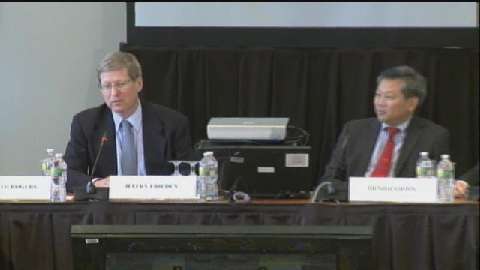The transcript and video for the IMF Book Forum (October 14th) is now online here. Nobel Laureate George Akerlof (UC Berkeley) moderated, Diane Lim Rogers (EconomistMom, Concord Coalition) and Gail Cohen (Joint Economic Committee) were discussants, and Simon Johnson (Baseline Scenario, MIT) provided concluding comments.
For those who wish to see the slides unencumbered by text, click here. For more background information, see here.

Menzie, any comments on the damage done by the establishment/Fed to the commercial banking industry and thus small business and the middle class?
See:
http://www.realclearmarkets.com/blog/Malfeasant%20Central%20Bankers%2C%20Again%2C%20November%202011%5B1%5D.pdf
A good and smooth reading,sensitivity correct,well written and accurate.The shortfalls (please read Econbrowser comments IMF Book Forum: Lost Decades) may not provide for the full knowledge of the right recipe for an economic disaster of earth dimension to any new Neron, Caligula, Sylla.
The morale is safe, the Incitatus have a wealth of experience and may bray and graze peacefully.
OT:
We are seeing a number of companies who had prior targeted the renewables sector now changing their focus to oil and gas or industrials.
Some examples:
– venture capital-backed start-up looking to make artificial fuel now applying the process to make intermediate petrochemicals more efficiently
– solar thermal group looking to use solar thermal storage technologies to utilize waste heat in conventional power plants, production processes
– group with CO2 separation technology for carbon capture and sequestration (CCS) looking to use technology for low-pressure O2 separation for use in industrial processes
So, there’s a general migration away from renewable technologies. In many cases, the investment in these technologies may not be wasted, but rather redirected to commercial market segments.
I think that’s a positive and heartening development overall.
Menzie Any chance that your paper on cointegration and Dickey-Fuller/unit roots is in electronic form? In a couple of weeks I’m supposed to give a 2 day lecture on Box-Jenkins and beyond, and I’m always in the market to shamelessly steal from others.
Steve Kopits You’ve lost me. How is migration away from renewable technologies a “positive and heartening development” for the economy? By continuing to hitch our wagon to carbon based energy sources aren’t we throwing away an opportunity to develop exactly the kinds of tradeable goods that Menzie was talking about in his IMF talk?
2slugbaits: I wrote the paper over twenty years ago, before the development of the Johansen multivariate approach, so it’s outdated (to say the least). But here it is. For an updated approach, see this paper.
Jeeee Menzie, no wonder you support all them unions slackards in Wisconsin–you are just like them. Do you ever teach any undergraduates or are Wisconsin taxpayers paying your large salary for you to travel all over the place peddling your wares……wares that mean little to the Wisconsin students who pay for you to be in the classroom with them? I guess this is why Wisconsin was voted one of the top five least academically challenging schools in the country. Keep up the good educational work, and the heck with the student paying for your largess.
Menzie Thanks for the link. Your older paper had some interesting examples of unit root processes. A data generating process I will be discussing in a few weeks involves operating tempos of military equipment (e.g., helicopter flying hours, Abrams tanks miles travelled, etc.). Intuitively it’s not obvious why optempo would follow a unit root path; afterall, each beginning period’s data can be thought of as being reset to zero, so that month’s or quarter’s optempo is like taking a first difference. And when you look at squadron or battalion level data that’s pretty much what you see. But when you look at optempo aggregated to the theater or global level the time series is clearly nonstationary with very high and very slowly decaying ACFs. Strong evidence for unit roots coming at it from either the ADF end or the KPSS end. Mission pulses have, if not a permanent effect, then at least a very long lived effect. A possible intuitive explanation is that since future optempo budgets are driven by past optempo history, the tendency is for shocks to become permanent. I suppose zero-based budgeting might fix that. Anyway, a lot of logistics data is regressed against optempo. Since many of the logistics data are themselves nonstationary (e.g., due to “bullwhip” effects across supply echelons) the regressions are potentially spurious.
Bob: Are you a one-note johnny (or more specifically, are you unable to think of different comments?). On July 22, you commented:
At that time, I referred you to my website, where I have posted a lot of information. As I wrote:
Your comments merely reinforce the impression I have that you are both ignorant of the academic world, and you further lack the analytical capacity to come up with different criticisms.
2slugbaits: Very interesting; as I noted in the JPAM article, a lot of time series seem well characterized as unit root processes in the samples we observe; of course, we also know unit root tests are low power.
My bet is that you haven’t graded an undergraduate exam in years. And grading, as any honest academic will admit, is the only part of the job that is work…..and avoiding work is the religion of the academic ‘class’.
Education is perhaps the only industry where those who run the business hate the consumers. Kids paying what? $30,000 a year to attend Wisconsin and the last thing the faculty there want to be bothered with is teaching undergraduates.
Like I said, no wonder you support those union slackards. You have seen the slackard and he is you.
Bob: And you would lose. And I grade undergraduate independent studies term papers as well (and believe you me I don’t get extra pay for taking on independent study students).
By the way, I like teaching intermediate macro. You should take the class — maybe you would learn something.